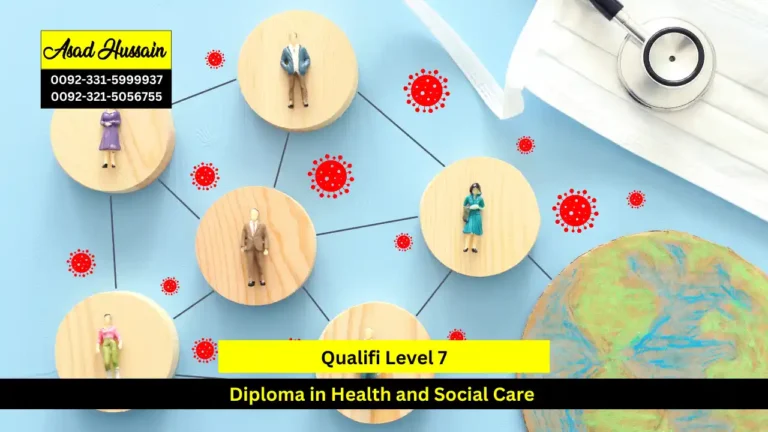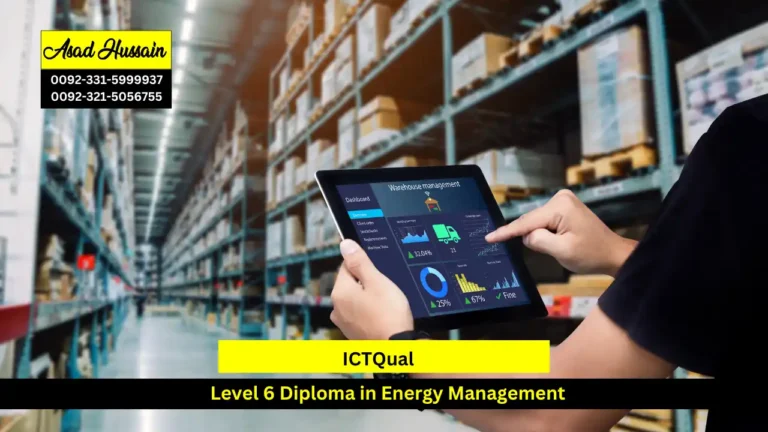The LICQual Level 7 Postgraduate Diploma in Healthcare Informatics is an advanced, globally recognized qualification designed for healthcare professionals, IT specialists, and administrators seeking to harness technology and data to transform healthcare delivery. In an era driven by digital transformation, healthcare informatics plays a vital role in improving patient outcomes, optimizing operations, and supporting evidence-based decision-making. This program equips learners with the technical, analytical, and managerial expertise required to lead digital innovation and data-driven strategies in modern healthcare environments.
LICQual Level 7 Postgraduate Diploma in Healthcare Informatics focuses on bridging the gap between healthcare systems and information technology. Learners gain a deep understanding of how data, artificial intelligence (AI), and electronic health records (EHRs) can enhance clinical efficiency, patient safety, and healthcare accessibility. The course integrates theoretical frameworks with practical applications, ensuring participants develop real-world skills in managing digital health systems, cybersecurity, and healthcare analytics.
Through this postgraduate diploma in healthcare informatics, learners will explore how technology supports clinical governance, quality improvement, and patient-centered care. They will examine topics such as data interoperability, digital transformation, and information management, allowing them to implement solutions that enhance coordination, reduce medical errors, and promote cost-effective care delivery. The course’s applied learning approach ensures that graduates can immediately apply their expertise in diverse healthcare settings.
Program Highlights
Mandatory Units
- Healthcare Information Systems and Digital Transformation
- Data Governance, Security, and Ethical Management in Healthcare
- Health Data Analytics and Evidence-Based Decision Making
- Telemedicine, e-Health, and Emerging Digital Health Technologies
- Research Methods in Healthcare Informatics
- Strategic Leadership and Change Management in Healthcare Informatics
he LICQual Level 7 Postgraduate Diploma in Healthcare Informatics are designed to ensure that learners possess the necessary academic background, professional experience, and language proficiency to succeed in this advanced qualification. This program is ideal for healthcare professionals, IT experts, and administrators seeking to develop leadership and analytical skills in healthcare informatics, data management, and digital transformation.
Age Requirements:
• Learners must be 21 years of age or above at the time of enrollment.
• Mature learners with relevant work experience but without formal qualifications may also be considered on a case-by-case basis.
Educational Requirements:
• A recognized Bachelor’s degree in Healthcare Management, Information Technology, Computer Science, Health Sciences, or a related discipline.
• Candidates with equivalent qualifications or professional certifications in healthcare informatics or digital health will also be considered.
Professional Experience:
• A minimum of two years of relevant work experience in healthcare, IT, or management roles.
• Applicants with extensive experience in healthcare systems, hospital administration, or digital health implementation are highly encouraged to apply.
English Language Proficiency:
• Non-native English speakers are required to demonstrate proficiency through IELTS (minimum score of 6.0) or an equivalent recognized qualification.
• Alternatively, applicants may present evidence of previous education or professional experience conducted in English.
Meeting these entry requirements ensures that learners are fully prepared to engage with the advanced concepts of healthcare informatics. Applicants who may not meet the full academic criteria but have substantial professional experience can qualify through the Recognition of Prior Learning (RPL) route. Learners seeking a strong foundation before advancing to this postgraduate level may consider the LICQual Level 6 Diploma in Healthcare Management, an ideal preparatory qualification for this program.
The LICQual Level 7 Postgraduate Diploma in Healthcare Informatics is designed to equip learners with advanced expertise in managing healthcare data, digital transformation, and evidence-based decision-making. Upon successful completion, learners will be able to demonstrate a comprehensive understanding of health informatics systems, data governance, digital health innovations, and strategic leadership within the healthcare sector. The following learning outcomes outline the specific skills, knowledge, and competencies developed throughout the program.
Healthcare Information Systems and Digital Transformation
• Demonstrate an advanced understanding of healthcare information systems, including their design, integration, and implementation within healthcare organizations.
• Assess the impact of digital transformation on patient care delivery, operational efficiency, and organizational performance.
• Apply critical thinking to evaluate the adoption of new technologies and digital strategies in clinical and administrative processes.
• Develop practical solutions for improving data flow, interoperability, and communication across healthcare departments.
• Implement innovative digital initiatives that enhance healthcare outcomes and align with institutional goals.
Data Governance, Security, and Ethical Management in Healthcare
• Explain key principles of healthcare data governance, regulatory compliance, and ethical standards in digital health management.
• Evaluate and apply best practices for maintaining data integrity, privacy, and security in healthcare systems.
• Analyze the implications of legal frameworks such as GDPR and HIPAA on healthcare data management.
• Design secure data management frameworks that protect patient information and support organizational accountability.
• Promote ethical decision-making in data handling, ensuring transparency, confidentiality, and public trust.
Health Data Analytics and Evidence-Based Decision Making
• Apply advanced analytical tools and methodologies to interpret complex healthcare data for informed decision-making.
• Utilize predictive analytics and statistical modeling to identify trends and improve clinical and operational outcomes.
• Integrate evidence-based approaches into healthcare planning, policy development, and patient management.
• Evaluate the effectiveness of data-driven initiatives in enhancing healthcare quality and performance.
• Translate analytical insights into strategic recommendations for healthcare improvement and innovation.
Telemedicine, e-Health, and Emerging Digital Health Technologies
• Understand the principles, applications, and challenges of telemedicine and e-health systems in modern healthcare.
• Assess the effectiveness of digital technologies in expanding healthcare accessibility and improving patient engagement.
• Evaluate the integration of wearable devices, mobile health applications, and AI-driven systems in healthcare delivery.
• Design and implement technology-driven healthcare solutions that support remote monitoring and virtual care.
• Analyze the ethical, regulatory, and technical aspects of digital health innovations to ensure sustainable implementation.
Research Methods in Healthcare Informatics
• Demonstrate proficiency in qualitative and quantitative research methodologies relevant to healthcare informatics.
• Design and conduct research projects addressing current issues in healthcare data management and digital transformation.
• Critically analyze academic literature to identify gaps, trends, and innovations in healthcare informatics research.
• Apply statistical and data analysis tools to evaluate healthcare research outcomes effectively.
• Present research findings professionally, aligning with academic and ethical standards in healthcare studies.
Strategic Leadership and Change Management in Healthcare Informatics
• Develop advanced leadership and management skills to guide digital transformation initiatives in healthcare organizations.
• Formulate strategies for effective change management, overcoming resistance, and ensuring stakeholder engagement.
• Analyze leadership models that foster innovation, collaboration, and performance improvement in healthcare informatics.
• Apply strategic planning and decision-making principles to align informatics initiatives with institutional objectives.
• Lead interdisciplinary teams to implement and sustain healthcare informatics projects successfully.
The LICQual Level 7 Postgraduate Diploma in Healthcare Informatics, learners will be fully prepared to lead digital innovation and transformation in healthcare environments. They will possess the analytical, managerial, and technical expertise to implement advanced informatics systems, ensure data integrity, and drive evidence-based decisions that enhance patient care and organizational excellence in a rapidly evolving healthcare landscape.
The LICQual Level 7 Postgraduate Diploma in Healthcare Informatics is a globally recognized qualification tailored for healthcare professionals, IT experts, administrators, and data managers seeking to lead digital transformation and innovation within the healthcare sector. In an era defined by technological advancement and data-driven healthcare delivery, this program equips learners with advanced knowledge, strategic leadership skills, and practical competencies essential for managing healthcare information systems and implementing digital health solutions that enhance patient outcomes and operational efficiency.
Healthcare Leaders and Managers
• Professionals currently working in or aspiring to leadership and managerial roles within hospitals, clinics, and healthcare organizations.
• Managers responsible for developing and implementing digital health strategies and information system management frameworks.
• Individuals aiming to strengthen their strategic leadership, data governance, and digital transformation capabilities.
• Leaders focused on improving healthcare efficiency, patient experience, and service delivery through technology-driven solutions.
• Administrators striving to align healthcare informatics initiatives with institutional goals and global healthcare standards.
Healthcare Professionals and Practitioners
• Doctors, nurses, and allied health professionals seeking to integrate data analytics and digital systems into clinical practice.
• Practitioners aiming to enhance their understanding of healthcare information systems, telemedicine, and e-health technologies.
• Professionals focused on improving patient safety, care coordination, and clinical decision-making through informatics tools.
• Clinicians interested in adopting electronic health records (EHRs) and digital health solutions to optimize workflow.
• Learners aspiring to leverage data insights for improved clinical performance and healthcare delivery.
IT Professionals and Digital Health Specialists
• IT professionals responsible for managing health information systems, cybersecurity, and healthcare data analytics.
• Specialists engaged in the design, integration, and maintenance of digital technologies in healthcare environments.
• Data scientists and informatics officers working to transform healthcare data into actionable insights for decision-making.
• System administrators and software developers aiming to apply informatics principles in healthcare technology solutions.
• Professionals interested in advancing their careers in digital health innovation, AI in healthcare, and health information management.
Policy Makers and Healthcare Administrators
• Policy makers and administrators involved in developing and implementing healthcare informatics policies and governance frameworks.
• Professionals responsible for ensuring compliance with data protection regulations and ethical management of patient information.
• Administrators overseeing departments related to digital transformation, health analytics, and healthcare IT systems.
• Decision-makers committed to aligning healthcare data strategies with international standards and institutional objectives.
• Leaders driving healthcare modernization and policy development to promote secure, efficient, and innovative systems.
Supervisors and Departmental Heads
• Supervisors overseeing digital health initiatives and healthcare information management operations.
• Departmental heads responsible for implementing electronic record systems, cybersecurity measures, and digital health platforms.
• Professionals coordinating cross-functional teams to ensure interoperability and data-driven decision-making in healthcare.
• Managers leading training programs to promote digital literacy, technology adoption, and quality improvement.
• Leaders fostering a culture of technological innovation, data security, and continuous improvement across healthcare departments.
Career-Focused Learners and Future Healthcare Informatics Leaders
• Individuals aspiring to build successful careers in healthcare informatics, data analytics, or digital health management.
• Learners preparing for leadership roles focused on healthcare IT, digital transformation, and strategic health innovation.
• Professionals aiming to progress in roles related to healthcare technology, policy-making, or health information governance.
• Career-driven individuals motivated to apply advanced informatics tools to improve healthcare outcomes and efficiency.
• Learners seeking to become influential leaders capable of shaping the future of digital healthcare systems and data management practices.
The LICQual Level 7 Postgraduate Diploma in Healthcare Informatics is ideal for professionals dedicated to advancing healthcare quality through digital innovation, data analytics, and strategic information management. Graduates will gain the expertise to lead complex digital health projects, ensure data integrity and security, and apply evidence-based decision-making to optimize healthcare services. This qualification prepares learners for senior roles in healthcare informatics, IT management, and digital transformation—empowering them to drive innovation and improve patient care outcomes in the global healthcare industry..







